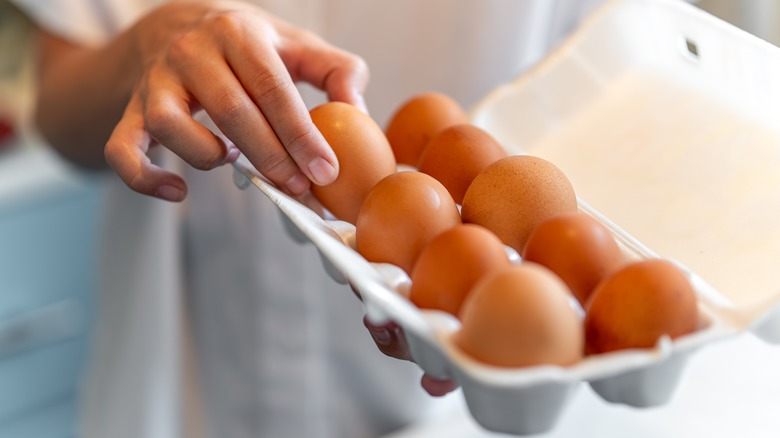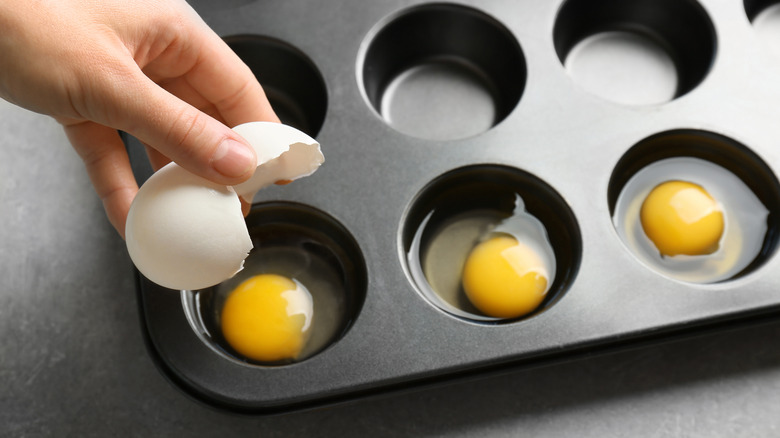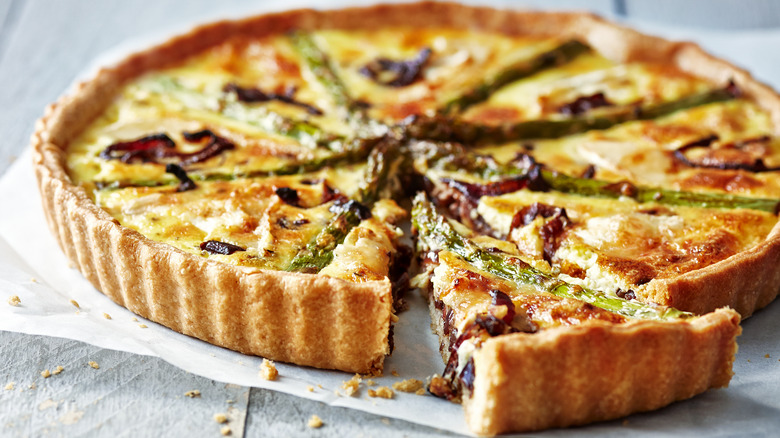You Can Freeze Eggs To Keep Them Fresher Longer
Whether you have a carton of eggs that's about to hit the freshness point of no return, or you made an egg white frittata and don't want to send half a dozen yolks down the sink drain, the freezer is your friend and can keep them fresher longer. While raw eggs have a fairly long shelf life in the fridge, they will keep for up to one year in the freezer, per the USDA. How to store and use the frozen eggs may vary slightly from how you would use fresh eggs, but with a little know-how, there's no need for any egg to go to waste.
You cannot freeze a whole egg in its shell, but you can crack it and stop the clock on the yolks and whites. The yolk and white can be mixed and frozen together, or you can separate them out. If you are freezing multiple eggs mixed together in one container, it's important to label how many there are for when it's time to defrost and use them.
And if you're thinking about preparing the eggs first, be aware that cooked egg whites do not freeze well on their own — so a hardboiled egg will fair poorly in the freezer, and its whites will have a rubbery texture. Cooked egg dishes where the white and yolk are mixed, however, freeze quite well. Those leftover lobster scrambled eggs you definitely don't want to go to waste deserve a spot in the freezer.
How to freeze raw eggs
Freezing one egg is simple, and an ice cube tray is the perfect vehicle to keep several single eggs separate so you can access one at a time. Crack the egg directly into the tray, give it a whisk, and cover it. You can also use the same method using a muffin tin and then transfer them into a freezer-safe bag so they're easier to store. If you want to freeze multiple whole eggs together, mix or blend the yolks and whites and freeze them in one container or bag. Egg yolks thicken when frozen, but whisking them together with the white will help with overall texture.
Freezing egg whites on their own is fairly straightforward. Carefully separate them from the yolk and place them in a container or bag. Because of the texture difference, make sure there are no golden remnants in the whites. The ice cube tray or muffin tin tip will also work if you want to keep multiple egg whites separate.
Freezing egg yolks requires a bit more attention, as they won't mix well with other ingredients once thawed due to their thicker, jelly-like consistency. Adding a bit of salt or sugar can help. Use one-half teaspoon of salt per every cup of eggs if you plan to use them in a savory dish, like a pancetta and cilantro quiche. For any future sweet dishes, such as sugared mango muffins, one and a half teaspoons of sugar will do the trick.
How to defrost and use frozen eggs
The best way to defrost frozen eggs is to thaw them in the fridge overnight. This will halt any chance for bacteria growth by ensuring they never drop below 40 degrees Fahrenheit. Place the container or bag on a paper towel to absorb any condensation, and keep your fridge shelves dry. You can also place the freezer bag or container under cold running water to speed up the thawing process if you're short on time. The goal is to make sure the eggs don't warm up too much — and for too long — while they defrost. The smaller the container you freeze them in, the faster they will defrost.
Defrosted eggs are best used as an ingredient in another dish. While you could enjoy them on their own and make a plain scramble, their time in the freezer may slightly affect their texture. Frozen eggs are best used for dishes such as egg casseroles, baked goods such as muffins and cookies, or frittatas and quiches.
When it comes to measuring out frozen whisked eggs once defrosted, a general rule of thumb is that one large egg is equivalent to 3 ¼ teaspoons of the mixture. It makes the most sense to freeze eggs in quantities you use often, such as five whole eggs for a quiche, or six yolks for your favorite crème brûlée recipe.



